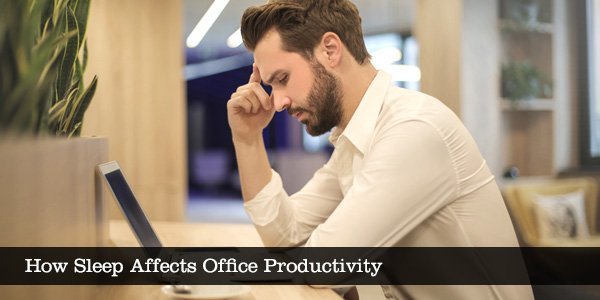How Sleep Affects Office Productivity
Sleep is something that we all love, yet we don’t always get as much as we need. Too many people either don’t get enough sleep or when they do, they’re not getting quality sleep. While sleep deprivation may not seem like a big deal, it can hold you back professionally, especially if your career depends on focus and productivity.
Over the past few years, successful organizations have finally started to see the impact that sleep deprivation can have on their employees including a decrease in productivity and health issues. As a result, many employers are actively pursuing ways to promote healthy sleep habits to their workers.
Here are just a few ways a lack of sleep can hinder office productivity:
- Decreased communication: When employees are tired, they can become poor communicators. A study revealed that sleep-deprived individuals drop the intensity of their voices, pause for longer intervals for no apparent reason, enunciate very poorly, mispronounce or slur words, repeat themselves and lose their place in a sentence sequence.
- Performance deteriorates: When an employee is sleep-deprived their functionality level is comparable to the 9th percentile of non-sleep deprived individuals. Performance declines can include increased compensatory efforts on activities, decreased vigilance and slower response time. While you would think that employees would notice these declines in performance, sleep-deprived individuals have poor insight into their performance deficits.
- More prone to distractions: When you’re sleep deprived you are more likely to have trouble with maintaining focus on relevant cues, developing and updating strategies, keeping track of events, maintaining interest in outcomes and attending to activities judged to be non-essential. In fact, research has revealed that there is a relationship between sleep deprivation and ADHD due to the overlap in symptoms.
- Increase in errors: The cognitive determinants of sleep deprivation increase concurrently with a worker’s time spent on a given task. This results in an increased number of errors. These can be both commission (performing an act that leads to harm) and omission (not performing an expected task) type mistakes.
Making sleep a priority can drastically improve your work performance. Here are a few ways that getting enough rest can improve your on-the-job performance:
- You’ll recover from distractions better: As mentioned above when you’re sleep deprived you have more trouble focusing on the task at hand compared to someone who is well rested. Getting a good night’s sleep will leave you feeling refreshed and ready to combat distractions throughout the day.
- You’ll make better decisions: It may not sound like much, but sleep improves your ability to make more accurate split-second decisions by about four percent.
- Your memory will improve: If you’re sleep-deprived, you have a greater chance of having a poorer working memory than those who are getting an ideal amount of sleep. Getting the sleep that your body needs are key for cementing what you’ve learned during the day.
- You’ll make fewer mistakes: Employees who are even moderately sleep-deprived have a 50 percent slower response time and a lower accuracy rate on simple tasks than someone who is under the influence of alcohol.
Getting a good night’s sleep is often easier said than done.
Here are a few common sleep problems that professionals face along with some helpful tips to help combat each issue.
Anxiety: It can be difficult to relax your mind after a long day, especially when you’re combating anxiety. If you suffer from an anxiety condition or even find yourself feeling anxious from time to time, you may find yourself struggling to convince your body to fall asleep. Try stretching before bed to loosen up your body. Meditation apps are also a great way to relax your mind before bed.
Busy Mind: Sometimes it can be hard to turn your brain off at night. In fact, your mind races with thoughts at night when you’re stressed instead of shutting down. Our bodies need to unwind in order to set the stage for sleep. Try developing a bedtime routine beginning at least one hour before bed that consists of relaxing activities to help dim your mind and unwind.
Discomfort: Sleep is the only time that our ligaments, muscles, and spine can completely relax. High-quality pillows are important for a good night’s sleep as it provides support for your neck and upper back. This support is needed when we are sleeping because the human spine is naturally curved. Having good support for your head and neck while you’re sleeping will help maintain the proper alignment of your spine. Sleeping without the adequate support will not only result in stiffness in your back and neck, but it will also have a negative impact on your sleep.
Hunger: Hunger pains have been known to keep the brain mentally alert, making it difficult to get a full night’s sleep. To avoid these hunger pains at night, try eating small meals throughout the day. When you skip out on meals it slows down your metabolism, while eating small meals throughout the days allows your body to obtain energy from fat stores overnight.
Not Tired: How frustrating are those nights where you can’t fall asleep simply because you’re not tired? If you find that you’re not tired when bedtime rolls around, steer clear of any electronic devices as the artificial blue light emitted by our electronic devices suppresses melatonin (the sleep-inducing hormone), making it more difficult to fall asleep. Try reading a book instead as this will help your mind prepare for sleep.
Sunday Night Insomnia: It can be difficult to fall asleep on Sunday night’s because Sunday is typically a “lazy day” for most of us, lacking in any physical and mental activity. When it’s time to go to bed, our bodies are not ready to because we haven’t actually been awake long enough. To prevent this from happening, a consistent sleep pattern is a must. Try sticking to the same bedtime and wake time on the weekends as you do during the week in order to regulate your internal body clock.
Temperature: When our external temperatures aren’t optimal our bodies have to work harder to self-regulate. This causes our body to repeatedly switch back and forth between shivering and sweating, except during the REM stage of sleep. By this point, our body’s shivering and sweating mechanisms are impaired, which forces our body to adjust to whatever the room temperature is resulting in an endless night of tossing and turning. For optimal sleep, keep your thermostat at 65 degrees Fahrenheit. Occasionally turning on your air conditioner for better sleep is well worth the cost it adds on your electric bill.
Noise: Sound and noise are often out of our control, but they have the potential to affect our rest. Sounds that have little impact during the day can even become bothersome a night. While these noises may not fully wake you up, they can arouse you slightly affecting your sleep cycle. Earplugs are a great way to cover up any noise disturbances. White noise is also great because it masks and drowns out background sounds.














